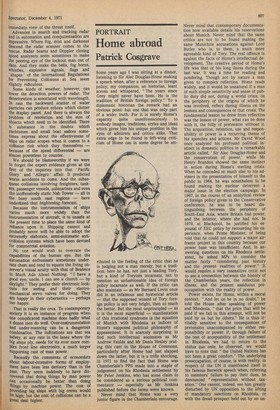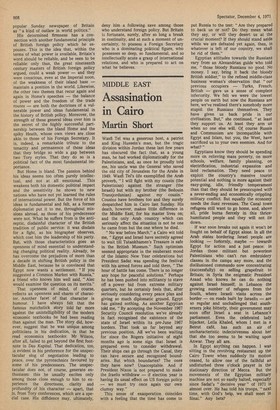PORTRAIT
Home abroad
Patrick Cosgrave
Some years ago I was sitting at a dinner, listening to Sir Alec Douglas-Home making a speech when, after a reference to foreign policy, my companion, an historian, leant across and whispered, "The years since Grey might never have been. He is the tradition of British foreign policy." To a diplomatic historian the remark had an obvious point: but one that was only part of a wider truth. For it is surely Home's capacity quite unselfconsciously to embody images, traditions, styles and ideas which gives him his unique position in the eyes of admirers and critics alike. That extra edge to be found in left-wing criticism of Home can in some degree be att ributed to the feeling of the critic that he is judging not a man merely, but a tradition: here he has, not just a leading Tory, but a kind of Toryism incarnate, not to mention an unfashionable idea of foreign policy incarnate as well. If the critic can also maintain — as Mr Bernard Levin once did in an infamous and hysterical article — that the supposed wizard of Tory foreign policy is not very bright, then so much the better. But the most unprincipled — as it is the most superficial — manifestation of this irrational syndrome is the equation of Munich with Rhodesia as indices of Home's supposed political philosophy of appeasement. It is scarcely surprising to find such intellectual soulmates as Mr Andrew Faulds and Mr Denis Healey prating this cant in the House of Commons, particularly after Home had just slapped down the latter, but it is a trifle shocking, in 1971 to find the fact that Home was Chamberlain's PPS made into a staple of judgement on his Rhodesia settlement by Mr Peter Jenkins, who has some claim to be considered as a serious political commentator — especially as Mr Jenkins published before the terms were known.
Never mind that Home was a very junior figure in the Chamberlain entourage. Never mind that contemporary documentation now available details his reservations about Munich. Never mind that the same critics are not to be found making the same Munichite accusations against Lord Butler who is, to them, a much more agreeable kind of Tory. The real offence is against the facts of Home's intellectual development. The creative period of Home's life was that of his long ilness during the last war. It was a time for reading and pondering. Though not by nature a man given to complex reflection. Home reads widely, and it would be unnatural if a man of such simple sensitivity and sense of public duty did not, during a world crisis, on the periphery of the origins of which he was involved, reflect during illness on the lessons and consequences of that crisis. The fundamental lesson he drew from reflection was the lesson of power, what can be done with it, the folly of pretension without it. The acquisition, retention, use and responsibility of power is a recurring theme of his speeches and actions. Mr David Wood once analysed his profound political instinct in domestic politics in a remarkable article called, 'Sir Alec Douglas-Home and the conservation of power,' while Mr Henry Brandon showed the same instinct in action during Home's sterling crisis. When he conceded so much else to his advisers in the presentation of himself to the public in 1964, he was nonetheless to be found making the nuclear deterrent a major issue in the election campaign. In 1967, in the course of an analytical review of foreign policy given to the Conservative conference, he was to be heard distinguishing between the periphery of South-East Asia, where Britain had power, and the interior, where she had not. In 1970, at Blackpool, he justified his espousal of EEC policy by recounting his experience, when Prime Minister, of being told that he could not support a major airframe project in this country because our power base was insufficient. And, in answering questions on his Rhodesia settlement, he asked MPs to consider the matter fairly "considering past history and the present realities of power." It would require a very insensitive critic not to see a connection between the history of the Chamberlain years, the reflection in illness, and the present assiduous preoccupation with the reality of power.
Power exists, for Home, within a moral context. "And let us be in no doubt," he told the House after speaking of power and Rhodesia, "that the price that will be paid if we fail in this attempt, will not be paid by us but by others." He is thus irritably sensitive to the consequences of pretension unaccompanied by either responsibility or power: if, through failure of the test of acceptability of the settlement in Rhodesia, we had to return to the status quo ante, he observed, we would have to note that "the United Nations has not been a great comfort." The underlying preoccupation, of course, is with reality: in respect of the UN it manifested itself in his famous Berwick speech when, referring to members' failure to pay their dues, he denounced "representation without taxation." One cannot, indeed, see him greatly disturbed by UN opposition to the lifting of mandatory sanctions on Rhodesia, or with the dread prospect held out by an un popular Sunday newspaper of Britain as "a kind of outlaw in world politics."
His determined firmness has a connection with another fundamental principle of British foreign policy which he espouses. This is the idea that, within the terms of what power is available, Britain's word should be reliable, and be seen to be reliable: only thus, the great nineteenth century masters of British foreign policy argued, could a weak power — and they were conscious, even at the Imperial noon, of the weakness of their island base — maintain a position in the world. Likewise, the other two themes that recur again and again in Home's speeches — the balance of power and the freedom of the trade routes — are both the doctrines of a vulnerable power and ideas fundamental in the history of British policy. Moreover, the strength of these general ideas over him is the secret of the highly successful partnership between the bland Home and the spiky Heath, whose own views are close akin to those of his Foreign Secretary. It is, indeed, a remarkable tribute to the tenacity and permanence of those ideas that they bridge so wide a gap between two Tory styles. That they do so is a political fact of the most fundamental importance.
But Home is bland. The passion behind his ideas seems too often purely intellectual, and not at all emotional. This weakens both his domestic political impact and the sensitivity he shows to new nations who have not yet learned the rules of international power. But the force of his ideas is fundamental and felt, as a former diplomatist put it to me, throughout missions abroad, as those of his predecessor were not. What he suffers from is the antiseptic, disdainful character of the British tradition of public service: it was disdain for a fight, as his biographer observes, which cost him the leadership of his party. But, with those characteristics goes an openness of mind essential to understanding changing political reality. Already, he has overcome the prejudices of more than a decade in shifting British policy in the Middle East, because he is convinced that Egypt now wants a settlement. "If you suggested a Common Market with Russia," a friend who knows him well said, "Alec would examine the question on its merits."
That openness of mind, of course, reflects an openness and charm of character. Another facet of that character is humour. I have always felt that the famous matchstick story told far more against the unintelligibility of the modern economic textbooks he had been reading than against the man. The story did, however, suggest that he was unique among politicians in his dedication, in that he read economics textbooks: Mr Wilson, after all, failed to get beyond the first footnote in Das Kapitai. That dedication, too, is evident in his preference for the unspectacular slog of negotiation leading to peace, over the pyrotechnics favoured by some of his predecessors. The unspectacular does not, of course, generate en thusiasm: this he usually excites only among those close enough to him to experience the directness, clarity and profundity of his character — apart, that Is, from Tory conferences, which are a special case. His diffidence may, ultimately, deny him a following save among those who understand foreign policy. But Britain is fortunate, surely, after so long a break in continuity, and at such a moment of uncertainty, to possess a Foreign Secretary who is a dominating political figure, who possesses so deep, so fundamental, and so intellectually acute a grasp of international relations, and who is prepared to act on what he believes.











































 Previous page
Previous page